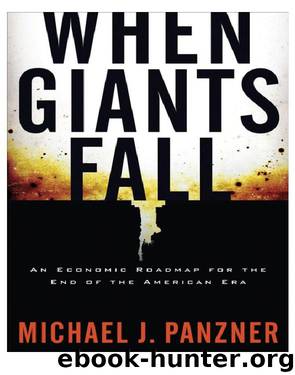When Giants Fall by Michael Panzner

Author:Michael Panzner [Panzner, Michael]
Language: eng
Format: epub, azw3, mobi
Publisher: John Wiley & Sons, Ltd.
Published: 2011-04-05T16:03:01+00:00
If Life Hands You Lemons, Make Lemonade
The coming changes represent a serious threat and, in some cases, an opportunity. Businesses that refuse to adapt or that assume austere conditions will only be temporary could face substantial risks, including bankruptcy. Those that map out plans based on growing smarter instead of bigger, that center on boosting efficiency as well as revenues, and that make serious allowances for disruptions and uncertainty will have an edge as times change. Many resource-dependent strategies that once made sense, or where the benefits were simply taken for granted, will have to be reevaluated. Outsourcing production to other firms or countries, especially those based thousands of miles away, could prove especially penny-wise and pound-foolish when the full array of logistical, economic, and political costs is factored in.
To some extent, staying ahead will boil down to paying much closer attention to how things are done. It will also be a matter of trying to turn operational lemons into lemonade. When key inputs are no longer cheap or available, several approaches make sense. One strategy is to mandate broad-based reductions in spending on energy, water, and other resources that will be harder to come by, forcing staff to figure out for themselves how to make do with less. Of course, it’s worth keeping in mind that a cold-turkey approach can lead to solutions that are not entirely consistent with other key goals. The effect can be like squeezing part of a balloon, only to see the trapped air bubble up elsewhere—or the whole thing explode.
Businesses can also seek out or invest in better equipment, improved processes, and innovative methods that offer more bang for the buck in terms of overall usage and efficiency. No doubt the up-front costs may prove especially hard swallow when the economy is reeling, financial resources are in short supply, and an unsettled outlook can make a return-on-investment winner suddenly seem doubtful, at best. Calculations depend, of course, on assumptions about the future. However, if all of the developments now brewing are taken into account, the economics of some marginal projects might still be compelling. Either way, those issues can be addressed only by taking the first step of exploring the full range of options.
Another approach is to search for ways to transform waste—which may now be difficult or costly to dispose of—into usable products or even valuable resources. That process can also generate environmental benefits. The avenues for boosting efficiency in this way are endless. Examples include reusing paper and shipping boxes; shredding office waste to create inexpensive packing material; converting used fats, motor oils, wood scraps, and similar by-products into cheap fuel for internal consumption or resale; warming facilities with heat thrown off by production lines and other operations; trimming electricity costs with more efficient lighting and timers that automatically switch power and machines on and off; harvesting rain and used tap water for outside irrigation; and insulating and repairing leaks in pipes and ducts carrying air, water, oil, and hot or cold air.
Download
When Giants Fall by Michael Panzner.azw3
When Giants Fall by Michael Panzner.mobi
This site does not store any files on its server. We only index and link to content provided by other sites. Please contact the content providers to delete copyright contents if any and email us, we'll remove relevant links or contents immediately.
| Elections & Political Process | Ideologies & Doctrines |
| International & World Politics | Political Science |
| Public Affairs & Policy | Specific Topics |
| United States |
The Secret History by Donna Tartt(19085)
The Social Justice Warrior Handbook by Lisa De Pasquale(12190)
Thirteen Reasons Why by Jay Asher(8909)
This Is How You Lose Her by Junot Diaz(6885)
Weapons of Math Destruction by Cathy O'Neil(6279)
Zero to One by Peter Thiel(5801)
Beartown by Fredrik Backman(5751)
The Myth of the Strong Leader by Archie Brown(5507)
The Fire Next Time by James Baldwin(5442)
How Democracies Die by Steven Levitsky & Daniel Ziblatt(5218)
Promise Me, Dad by Joe Biden(5153)
Stone's Rules by Roger Stone(5087)
A Higher Loyalty: Truth, Lies, and Leadership by James Comey(4960)
100 Deadly Skills by Clint Emerson(4924)
Rise and Kill First by Ronen Bergman(4788)
Secrecy World by Jake Bernstein(4752)
The David Icke Guide to the Global Conspiracy (and how to end it) by David Icke(4717)
The Farm by Tom Rob Smith(4507)
The Doomsday Machine by Daniel Ellsberg(4490)
